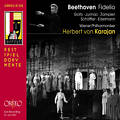ORFEO International – Reviews
Important Releases Briefly Introduced
August 2008
Salzburger Festspieldokumente 2008
During his first year as artistic director of the Salzburg Festival, it was almost a conscious policy on Herbert von Karajan’s part to court comparison with famous predecessors and eminent models and confront the larger-than-life figures of Wilhelm Furtwängler and Arturo Toscanini with his own interpretations of Beethoven’s Fidelio and Verdi’s final opera, Falstaff. In both cases, Karajan not only conducted, he also directed the operas. 
C 772 082 IIf his productions were often highly criticized, there was unanimous acclaim for his qualities as an opera conductor. And these are all that matters when we listen to the present live recordings of these two first nights from the 1957 Salzburg Festival. His Falstaff sparkles with Italianate brio and temperament, qualities due not least to his cast of singers imported from Milan. At their head is Tito Gobbi as Shakespeare’s fat knight, his performance capturing not only the comedy and down-at-heel disreputability of the character but also his innate nobility. The other singers include Elisabeth Schwarzkopf, Anna Moffo, Rolando Panerai and Luigi Alva, all of them familiar from studio recordings of the opera, while Giulietta Simionato’s Mistress Quickly is endowed with the necessary chest notes to invest her role with both humour and conviction. Karajan’s production of Fidelio 
C 771 082 Iwas staged in the Felsenreitschule and has something of the nature of an oratorio to it, a quality also evident on CD. Once again, the conductor showed great care in his choice of singers. As Leonore, Christel Goltz masters the tremendous challenges of the role in terms of its drama, agility and expression, while Giuseppe Zampieri’s Florestan combines the anguished tone traditionally associated with the part with an Italian cantilena. The other singers are all experienced interpreters of their roles, their voices showing none of the signs of wear and tear so often heard in these parts: Paul Schöffler is the arch-villain Pizarro, Otto Edelmann is Rocco, and Sena Jurinac and Waldemar Kmentt lend extra weight to Marzelline and Jaquino, whose roles are all too often treated as buffo parts. In both operas the Vienna State Opera Chorus and Vienna Philharmonic serve notice of their exceptional status, performing two such different works within the space of only a few days and not only bringing to them the greatest possible ardour but also clearly distinguishing between their different musical idioms.
top |